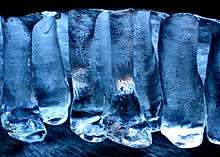Definify.com
Webster 1913 Edition
ice
ice
(īs)
, Verb.
T.
[
imp. & p. p.
iced
(īst)
; p. pr. & vb. n.
icing
(ī′sĭng)
.] 1.
To cover with ice; to convert into ice, or into something resembling ice.
3.
To chill or cool, as with ice; to freeze.
Webster 1828 Edition
Ice
ICE
,Noun.
1.
Water or other fluid congealed, or in a solid state; a solid, transparent, brittle substance, formed by the congelation of a fluid, by means of the abstraction of the heat necessary to preserve its fluidity, or to use language, congealed by cold.2.
Concreted sugar.To break the ice, is to make the first opening to any attempt; to remove the first obstructions or difficulties; to open the way.
ICE
,Verb.
T.
1.
To cover with concreted sugar; to frost.2.
To chill; to freeze.Definition 2026
ice
ice
English

Ice.
Noun
ice (countable and uncountable, plural ices)
- (uncountable) Water in frozen (solid) form.
- 1882, Popular Science Monthly Volume 20, The Freezing of a Salt Lake
- It has always been difficult to explain how ice is formed on the surface of oceans while the temperature of maximum density is lower than that of cogelation, and the observations on this lake were instituted in the hope that they might throw light upon the subject.
- 2013 May 11, “The climate of Tibet: Pole-land”, in The Economist, volume 407, number 8835, page 80:
- Of all the transitions brought about on the Earth’s surface by temperature change, the melting of ice into water is the starkest. It is binary. And for the land beneath, the air above and the life around, it changes everything.
- 1882, Popular Science Monthly Volume 20, The Freezing of a Salt Lake
- (uncountable) Covering made of frozen water on a river or other water basin in cold season.
- (uncountable, physics, astronomy) Any frozen volatile chemical, such as ammonia or carbon dioxide.
- (uncountable, astronomy) Any volatile chemical, such as water, ammonia, or carbon dioxide, not necessarily in solid form.
- (countable) A frozen dessert made of fruit juice, water and sugar.
- (uncountable) Any substance having the appearance of ice.
- (uncountable, slang) One or more diamonds.
- (uncountable, slang, drugs) Crystal form of methamphetamine.
- (uncountable, ice hockey) The area where a game of ice hockey is played.
- 2006, CBC, Finland, Sweden 'the dream final', February 26 2002,
- The neighbouring countries have enjoyed many great battles on the ice. They last met for gold at the 1998 world championship, won by Sweden. Three years earlier, Finland bested Sweden for the only world title in its history.
- 2006, CBC, Finland, Sweden 'the dream final', February 26 2002,
Hyponyms
Hyponyms of ice
|
|
Derived terms
Terms derived from ice
Related terms
Related terms
Translations
water in frozen form
|
|
frozen volatile chemical
frozen dessert
|
|
substance having the appearance of ice
diamond — see diamond
crystal methamphetamine
icehockey: area where game is played
Verb
ice (third-person singular simple present ices, present participle icing, simple past and past participle iced)
- To cool with ice, as a beverage.
- To become ice, to freeze.
- (slang) To murder.
- To cover with icing (frosting made of sugar and milk or white of egg); to frost; as cakes, tarts, etc.
- (ice hockey) To put out a team for a match.
- Milton Keynes have yet to ice a team this season
- (ice hockey) To shoot the puck the length of the playing surface, causing a stoppage in play called icing.
- If the Bruins ice the puck, the faceoff will be in their own zone.
Derived terms
Translations
to cool with ice
|
to freeze
|
to murder
to cover with icing
ice hockey: to put a team on ice for a match
|
ice hockey: to shoot an icing
|